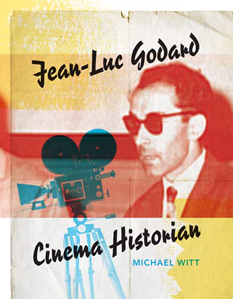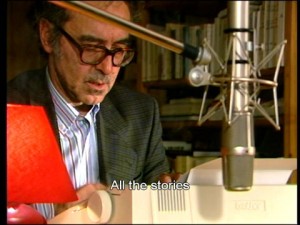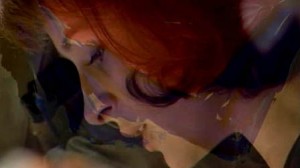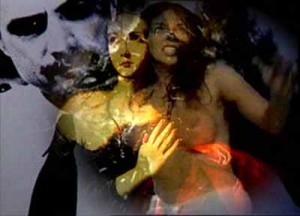Published, in a slightly shorter version, in the August 2014 Sight and Sound. — J.R.
JEAN-LUC GODARD, CINEMA HISTORIAN
By Michael Witt. Indiana University Press, 276pp. £20.65.
paperback, ISBN 9780253007285
Reviewed by Jonathan Rosenbaum
There has been a slew of important books lately devoted to post-60s Godard, including Daniel Morgan’s Late Godard and the Possibilities of Cinema, Jerry White’s Two Bicycles: The Work of Jean-Luc Godard and Anne-Marie Miéville, and Godard’s own Introduction to a True History of Cinema and Television, translated by Timothy Barnard — the latter including Michael Witt’s introductory, 55-page ‘Archaeology of Histoire(s) du cinéma’. But none seems quite as durable, both as a beautiful object and as a user-friendly intellectual guide, as Witt’s superbly lucid, jargon-free book about Histoire(s) du cinéma, Jean-Luc Godard, Cinema Historian.
Copiously illustrated with frame enlargements that complement the text without ever seeming redundant, this examination of the philosophical, historical, and aesthetic underpinnings of Godard’s masterwork isn’t only about a four and a half-hour video; it’s also about the work’s separate reconfigurations as a series of books, a set of CDs, and a 35-millimeter feature of 84 minutes (Moments choisis des Histoire(s) du cinéma). And one of Witt’s major achievements is to clarify just what Godard means — and doesn’t mean — by ‘histoire’, ‘cinéma,’ and even ‘du’ (‘of’ or ‘by’). Godard’s history (or story) is more a matter of poetry than chronicle, with ties to Benjamin, Braudel, Foucault, and Michelet; his “cinema” is quite distinct from “film,” having more to do with a collective leap in national self-awareness (as in Italian Neorealism) than with any individual achievement. So what Godard means by the ‘decline’ or ‘death’ of cinema excludes his reverence for such key individual artists as Chaplin, Dreyer, Hitchcock, Nicholas Ray, and Welles and revolves around the failure of film at mid-century to confront the Holocaust.
Regarding Histoire(s) as Godard’s magnum opus that brings coherence to and reveals continuity with the remainder of his work, Witt persuasively plots out many extensive through-lines. Yet there are times when I wish his conceptual and referential frames were still wider. The overall orientation of his study is, to coin a term, francocentric, so you won’t find Eliot, Joyce, Pound, or even Hammett listed in the index; I also regret the neglect of many of Godard’s key works as a film critic, including his reviews of Bitter Victory, Hollywood or Bust, Man of the West, Montparnasse 19, and The Wrong Man. When Witt discusses the importance of Alain Resnais’ early work to Godard, he overlooks both La chant du styrène (which inspired some of Godard’s most rapturous critical prose) and Last Year at Marienbad, much of whose soundtrack is included in the first episode of Histoire(s), as Witt himself recalls in a subsequent chapter.
Considering Witt’s thoroughness as a researcher, my only factual quibbles derive from specialized information he can readily be excused for not knowing: his claim that Godard was able to use all the film clips he’d selected for Histoire(s) once Gaumont agreed to clear all the rights is contradicted by a penultimate, prelease edit of three of the later episodes that Godard once sent to me, and his subsequent suggestion that Godard saw Truffaut’s La chamber verte is refuted by my failure to convince Godard he should see it, if only for its implicit critique of la politique des auteurs. But this is mere hair-splitting about an essential book.





